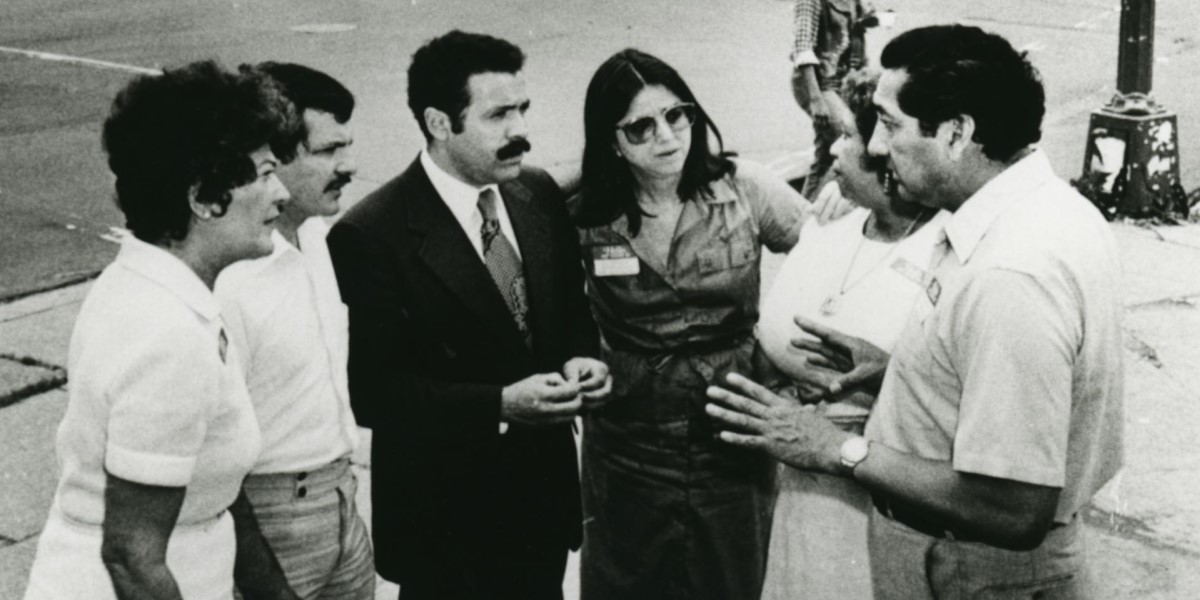UMD INFO PhD student Manuel Mendez chronicles Black Latine lived experience in the DC area

Casilda Luna, second from right, in conversation with a group in Washington, DC's Columbia Heights neighborhood, ca. 1970s. (Photo from Black Mosaic Exhibition Records, Anacostia Community Museum)
The Black Mosaic Podcast represents the promise of reparative archives (Hughes-Watkins, 2018) and digital humanities. The project, led by University of Maryland College of Information (INFO) PhD student Manuel Mendez, chronicles Black Latine lived experience in the Washington Metropolitan area. It is targeted toward Afro-Latine youth, who seldom encounter representations of Black racialized Spanish-speaking people in portrayals of Latinidiad.
Mendez found inspiration in his own story: Under a repressive dictatorship in the Dominican Republic in the 1950s, answering incorrectly could cost your life. Juan Matos, a navy sailor, misspoke when asked about his honest opinion about Rafael L. Trujillo. Juan, now forgotten, was first tortured and then chopped to be devoured by sharks. A whole family was in danger because of a mistake like the one made by my great-uncle. Mendez’s aunt Glady understood that she had to change her last name. The entire Matos family was in danger, and my great-aunt decided to leave the island with another last name. His grandfather Esteban was happy to give her his, Mendez. Glady was to come to the United States and settle in Washington, DC. Juan’s story is a family story with lessons of caution and our right to stand for what we believe.
The Mendez family’s migration to the nation’s capital is part of patterns of silence and political oppression that warrant visibility. Here in the nation’s capital, African Americans embraced Mendez and taught him the connectedness and importance of our African Diaspora. As a scholar, Mendez aims to expand the knowledge and initiatives involving communities of color, digital/oral history documentation, emancipatory library, archival, library, and information science practices. Casilda Luna is considered the grandmother of the Latino community, but only recently has attention been given to this black Dominican. How does a community forget its mother? Elenor Holmes Norton honored Casilda’s long, countless accomplishments in 2016, yet no attention has been paid to Ms. Luna.
“I spent two years begging and pleading with community members and elders to meet Casilda. I was eager to interview the 98-year-old Casilda to learn about her experiences as a Black Dominican in Washington, DC. Casilda’s unacknowledged efforts that helped families in the community transformed the Latino community in DC. Her advocacy and activism set the foundation for everything we benefit from in the community.” – Mendez
To pay homage to the 1994 Black Mosaic immigrant exhibition in Anacostia Community Museum, Mendez and team named their Hispanic Heritage Month special project “Our Black Mosaic,” a two episode podcast featured as part of the Porchtales podcast series, a collaborative project involving Humanities DC, the teacher and poet Angeley Crawford Gibb, and Mendez. Angeley Crawford Gibb, an educator, and orator, focuses on identity development, specifically adolescent ethnic identity development and language. The project serves as a tribute to Afro-Latinx people and seeks to bridge intergenerational and cultural gaps through radical love and collective voice.
The two-episode series focuses first on “A Love Letter to Afro-Latine Youth.” The Afro-Latine experiences in the DMV are addressed and included in its history. The mainstream Latino history started in the 1980s, which is a common misconception. “Our Black Mosaic” aims to complicate that narrative in a riveting conversation about anti-blackness, youth, and why these stereotypes continue to plague our community. The second episode, “Motherless Children,” is dedicated to Casilda Luna, the Mother of the Latino Community. In an exclusive interview, Casilda discusses her upbringing, her move to the United States, and how she became a trailblazer for the Latino community.
Some generations have been silenced by violence, while others have been intentionally overlooked, their histories ignored in books and research. Mendez and the team’s goal with this podcast project is to articulate and share their own truth, which makes “Our Black Mosaic” more than just a podcast; it is a dedicated platform with a vital mission. They follow early Black information scientist Arturo Alfonso Schomburg’s guidance on the purpose of history: “History must restore what slavery took away, for it is the social damage of slavery that present generations must repair and offset.” This mission is urgent, and and you are invited to participate. Join in honoring Casilda Luna by signing this petition to celebrate her contributions while she is still with us.
References
Hughes-Watkins, L. L. (2018). Moving toward a reparative archive: A roadmap for a holistic approach to disrupting homogenous histories in academic repositories and creating inclusive spaces for marginalized voices. Journal of Contemporary Archival Studies, 5(1), 6.
Black Mosaic: Community, Race, and Ethnicity among Black Immigrants in Washington, D. C. Exhibition Records | Anacostia Community Museum. (n.d.). Anacostia Community Museum. Retrieved November 7, 2024, from https://anacostia.si.edu/collection/archives/sova-acma-03-027
Schomburg, A. A. (1925). The Negro digs up his past. The new Negro: an interpretation, 231-37.